How to implement PHP permission management function
The following editor will bring you an example of how to implement permission management functions in PHP. The editor thinks it’s pretty good, so I’ll share it with you now and give it as a reference. Let’s follow the editor to take a look.
Permission management system is mainly used to set different permissions for different users, so that users with different permissions can use different functions after logging in.
First look at the database
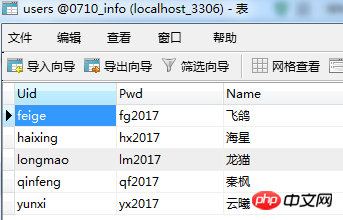
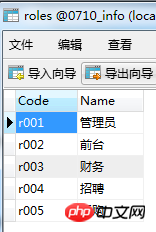
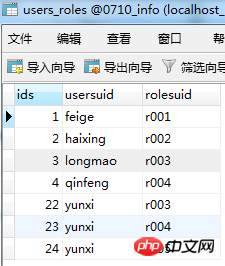
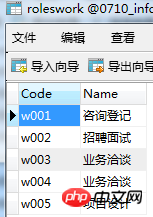
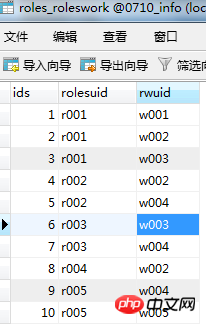
1.Admin page RBAC.php
##
<!DOCTYPE html>
<html>
<head>
<meta charset="UTF-8">
<title>权限管理</title>
<script src="bootstrap/js/jquery-1.11.2.min.js"></script>
</head>
<body>
<h2>用户与角色管理</h2>
<p>
请选择用户:
<select id="user">
<?php
require_once "./DBDA.class.php";
$db = new DBDA();
$sql = "select * from users";
$arr = $db->query($sql,0);
foreach($arr as $v){
echo "<option value='{$v[0]}'>{$v[2]}</option>";
}
?>
</select>
</p>
<br />
<p>
请选择角色:
<?php
$sql = "select * from roles";
$arr = $db->query($sql,0);
foreach($arr as $v){
echo "<input type='checkbox' class='ck' value='{$v[0]}'>{$v[1]}";
}
?>
</p>
<br />
<input type="button" value="确认" id="btn"/>
</body>
<script>
sel(); //选中默认角色
$("#user").change(function(){
//当用户选中变化的时候,去选中相应角色
sel();
})
//点击确定保存角色信息
$("#btn").click(function(){
var uid = $("#user").val();
var ck = $(".ck");
var role = "";//初始为空
for(i=0;i<ck.length;i++){
var v = ck.eq(i).val();
if(ck.eq(i).prop("checked")){
role += ck.eq(i).val()+"|";
}
}
$.ajax({
type:"POST",
url:"RBbtnchuli.php",
data:{uid:uid,role:role},
dataType:"TEXT",
success:function(data){
alert("修改成功!");
}
});
})
//选中默认角色的封装方法
function sel(){
var uid = $("#user").val();
$.ajax({
url:"RBchuli.php",
data:{uid:uid},
type:"POST",
dataType:"TEXT",
success:function(data){
var role = data.split("|");
var ck = $(".ck");
ck.prop("checked",false);
for(i=0;i<ck.length;i++){
var v = ck.eq(i).val();
if(role.indexOf(v)>=0){
ck.eq(i).prop("checked",true);
}
}
}
});
}
</script>
</html>2. The processing page for administrator RBchuli.php
<?php
$uid = $_POST["uid"];
require_once "./DBDA.class.php";
$db = new DBDA();
$sql = "select rolesuid from users_roles where usersuid='{$uid}'";
echo $db->StrQuery($sql,0); 保存角色信息的处理页面RBbtnchuli.phpThe processing page for saving role information RBbtnchuli.php
<?php
$uid = $_POST["uid"];
$role = $_POST["role"];//字符串
$role = substr($role,0,strlen($role)-1);
$arr = explode("|", $role);
require_once "./DBDA.class.php";
$db = new DBDA();
//删除
$sdel = "delete from users_roles where usersuid='{$uid}'";
$db->query($sdel);
//添加
foreach($arr as $v){
$sql = "insert into users_roles values(0,'{$uid}','{$v}')";
$db->query($sql);
}The effect is as shown below:

##The next thing to do is to log in to an account. Check your own functions
##
<!DOCTYPE html>
<html>
<head>
<meta charset="UTF-8">
<title></title>
<script src="bootstrap/js/jquery-1.11.2.min.js"></script>
<script src="bootstrap/js/bootstrap.min.js"></script>
<link href="bootstrap/css/bootstrap.min.css" rel="external nofollow" rel="stylesheet" type="text/css"/>
</head>
<style>
.title{
margin-left: 600px;
margin-top: 150px;
}
.quanju{
margin-left: 450px;
margin-top: -180px;
}
.name,.pwd{
max-width: 120px;
}
.yangshi1{
margin-top: 200px;
}
</style>
<body>
<form class="form-horizontal" role="form" action="RBloginchuli.php" method="post">
<h3 class="title">用户登录</h3>
<p class="quanju">
<p class="form-group yangshi1">
<label for="firstname" class="col-sm-2 control-label">用户名:</label>
<p class="col-sm-10">
<input type="text" class="form-control name" name="uid" placeholder="请输入用户名">
</p>
</p>
<p class="form-group yangshi2">
<label for="lastname" class="col-sm-2 control-label">密码:</label>
<p class="col-sm-10">
<input type="text" class="form-control pwd" name="pwd" placeholder="请输入密码">
</p>
</p>
<p class="form-group">
<p class="col-sm-offset-2 col-sm-10">
<p class="checkbox">
<label>
<input type="checkbox">
保存密码 </label>
<label>
<input type="checkbox">
下次自动登录 </label>
</p>
</p>
</p>
<p class="form-group">
<p class="col-sm-offset-2 col-sm-10">
<button type="submit" class="btn btn-warning" value="登录" onclick="return login()" >
登录
</button>
</p>
</p>
</p>
</form>
</body>
</html>
4. Login page processing page RBloginchuli.php
<?php
session_start();
$uid = $_POST["uid"];
$pwd = $_POST["pwd"];
require_once "./DBDA.class.php";
$db = new DBDA();
$sql = "select pwd from users where uid='{$uid}'";
$mm = $db->StrQuery($sql,0);
if(!empty($pwd) && $pwd==$mm){
$_SESSION["uid"] = $uid;
header("location:RBmain.php");
}else{
echo "<script>alert('用户名或密码有误!')</script>";
}
5. Finally, make the user’s main page RBmain. php
<!DOCTYPE html>
<html>
<head>
<meta charset="UTF-8">
<title>权限主页面</title>
</head>
<body>
<?php
session_start();
if(empty($_SESSION["uid"])){
header("location:RBlogin.php");
exit;
}
$uid = $_SESSION["uid"];
require_once "./DBDA.class.php";
$db = new DBDA();
//子查询
$sql = "select * from roleswork where code in (select * from roles_roleswork where rolesuid in (select * from users_roles where usersuid='{$uid}'))";
$arr = $db->query($sql,0);
foreach($arr as $v){
echo "<p class='menu'>{$v[1]}</p>";
}
?>
</body>
</html>The effect is as shown:
The above is the detailed content of How to implement PHP permission management function. For more information, please follow other related articles on the PHP Chinese website!

Hot AI Tools

Undresser.AI Undress
AI-powered app for creating realistic nude photos

AI Clothes Remover
Online AI tool for removing clothes from photos.

Undress AI Tool
Undress images for free

Clothoff.io
AI clothes remover

Video Face Swap
Swap faces in any video effortlessly with our completely free AI face swap tool!

Hot Article

Hot Tools

Notepad++7.3.1
Easy-to-use and free code editor

SublimeText3 Chinese version
Chinese version, very easy to use

Zend Studio 13.0.1
Powerful PHP integrated development environment

Dreamweaver CS6
Visual web development tools

SublimeText3 Mac version
God-level code editing software (SublimeText3)

Hot Topics
 1662
1662
 14
14
 1419
1419
 52
52
 1313
1313
 25
25
 1262
1262
 29
29
 1235
1235
 24
24
 How do you parse and process HTML/XML in PHP?
Feb 07, 2025 am 11:57 AM
How do you parse and process HTML/XML in PHP?
Feb 07, 2025 am 11:57 AM
This tutorial demonstrates how to efficiently process XML documents using PHP. XML (eXtensible Markup Language) is a versatile text-based markup language designed for both human readability and machine parsing. It's commonly used for data storage an
 Explain JSON Web Tokens (JWT) and their use case in PHP APIs.
Apr 05, 2025 am 12:04 AM
Explain JSON Web Tokens (JWT) and their use case in PHP APIs.
Apr 05, 2025 am 12:04 AM
JWT is an open standard based on JSON, used to securely transmit information between parties, mainly for identity authentication and information exchange. 1. JWT consists of three parts: Header, Payload and Signature. 2. The working principle of JWT includes three steps: generating JWT, verifying JWT and parsing Payload. 3. When using JWT for authentication in PHP, JWT can be generated and verified, and user role and permission information can be included in advanced usage. 4. Common errors include signature verification failure, token expiration, and payload oversized. Debugging skills include using debugging tools and logging. 5. Performance optimization and best practices include using appropriate signature algorithms, setting validity periods reasonably,
 Explain late static binding in PHP (static::).
Apr 03, 2025 am 12:04 AM
Explain late static binding in PHP (static::).
Apr 03, 2025 am 12:04 AM
Static binding (static::) implements late static binding (LSB) in PHP, allowing calling classes to be referenced in static contexts rather than defining classes. 1) The parsing process is performed at runtime, 2) Look up the call class in the inheritance relationship, 3) It may bring performance overhead.
 PHP Program to Count Vowels in a String
Feb 07, 2025 pm 12:12 PM
PHP Program to Count Vowels in a String
Feb 07, 2025 pm 12:12 PM
A string is a sequence of characters, including letters, numbers, and symbols. This tutorial will learn how to calculate the number of vowels in a given string in PHP using different methods. The vowels in English are a, e, i, o, u, and they can be uppercase or lowercase. What is a vowel? Vowels are alphabetic characters that represent a specific pronunciation. There are five vowels in English, including uppercase and lowercase: a, e, i, o, u Example 1 Input: String = "Tutorialspoint" Output: 6 explain The vowels in the string "Tutorialspoint" are u, o, i, a, o, i. There are 6 yuan in total
 What are PHP magic methods (__construct, __destruct, __call, __get, __set, etc.) and provide use cases?
Apr 03, 2025 am 12:03 AM
What are PHP magic methods (__construct, __destruct, __call, __get, __set, etc.) and provide use cases?
Apr 03, 2025 am 12:03 AM
What are the magic methods of PHP? PHP's magic methods include: 1.\_\_construct, used to initialize objects; 2.\_\_destruct, used to clean up resources; 3.\_\_call, handle non-existent method calls; 4.\_\_get, implement dynamic attribute access; 5.\_\_set, implement dynamic attribute settings. These methods are automatically called in certain situations, improving code flexibility and efficiency.
 PHP and Python: Comparing Two Popular Programming Languages
Apr 14, 2025 am 12:13 AM
PHP and Python: Comparing Two Popular Programming Languages
Apr 14, 2025 am 12:13 AM
PHP and Python each have their own advantages, and choose according to project requirements. 1.PHP is suitable for web development, especially for rapid development and maintenance of websites. 2. Python is suitable for data science, machine learning and artificial intelligence, with concise syntax and suitable for beginners.
 PHP in Action: Real-World Examples and Applications
Apr 14, 2025 am 12:19 AM
PHP in Action: Real-World Examples and Applications
Apr 14, 2025 am 12:19 AM
PHP is widely used in e-commerce, content management systems and API development. 1) E-commerce: used for shopping cart function and payment processing. 2) Content management system: used for dynamic content generation and user management. 3) API development: used for RESTful API development and API security. Through performance optimization and best practices, the efficiency and maintainability of PHP applications are improved.
 PHP: A Key Language for Web Development
Apr 13, 2025 am 12:08 AM
PHP: A Key Language for Web Development
Apr 13, 2025 am 12:08 AM
PHP is a scripting language widely used on the server side, especially suitable for web development. 1.PHP can embed HTML, process HTTP requests and responses, and supports a variety of databases. 2.PHP is used to generate dynamic web content, process form data, access databases, etc., with strong community support and open source resources. 3. PHP is an interpreted language, and the execution process includes lexical analysis, grammatical analysis, compilation and execution. 4.PHP can be combined with MySQL for advanced applications such as user registration systems. 5. When debugging PHP, you can use functions such as error_reporting() and var_dump(). 6. Optimize PHP code to use caching mechanisms, optimize database queries and use built-in functions. 7




